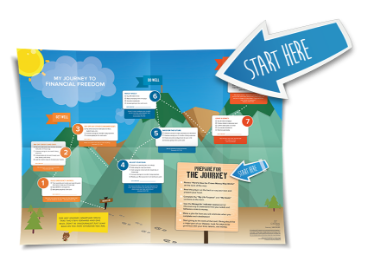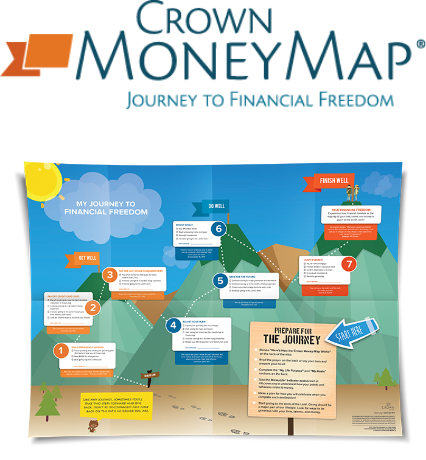Life is so simplistic in our youth. Of course, we don’t realize it at the time. It is methodically organized by semesters and terms with an easy-to-follow routine from dawn to dusk. We are given pre-planned coursework and told if we follow the plan, it will result in a degree (high school and college). This piece of paper confers some type of “adult” quality on us and gives us false confidence. Much to our surprise, real adulthood is confusing, nonlinear, and demanding. No one has planned it for us, and there seems to be a different point of view on everything we encounter.
The blender of life is constantly churning as we run children to school, take care of our families, and try to understand what a “work life balance” even is. We strive for success in our careers while trying to hold on to a sense of self identity and still find a moment for ourselves. We are pulled into a myriad of community, church, and charitable events.
Pulled to the extreme; we have no margin and the marathon of mid-life continues.

Have you felt this way? I have. I do. Constantly. At times I have dreamed of going back to the easy days of college to enjoy the simpler life that I did not fully appreciate at the time. For many of us, education was the bedrock of our lives – everything revolved around it. We then enter adulthood and that routine becomes a relic of the past.
However, in this new global economy, things change so rapidly that education cannot be relegated to a period of our youth. We must find a way to weave this into our schedules on a regular basis. It is the best insurance policy we have for the future. Much like buying home, life, and auto insurance is a given in our lives, education and self-development must be the same for our careers.
Crafting a tailored education plan is important, but it looks different for each person. A stay-at-home “Mommy blogger” will have different needs than a budding freelancer, who has different needs than someone trying to climb a corporate ladder. No matter what your goal, these are the four things you need to consider as you build an education plan for success.
Two Perspectives, One Outcome
Silicon Valley investor Peter Thiel, a graduate of Stanford University and cofounder of PayPal, has said he believes a college education is overrated. So, he started the Thiel Fellowship, encouraging students to dropout of school to start a business. Those who he accepts are given $100,000 and two years of personal mentorship to start their endeavor. Many have used this in arguments to say, “See, I don’t need to go to college! This expert agrees it is a waste of time and money.”
On the other hand, George Washington Law Professor Neil Buchanan wrote an impassioned article, “The One Percent and the Rewards of Education”, stating that “If economics teaches us anything, it’s that education leads to prosperity.” This is the opposing view of Thiel – both are extremely intelligent, successful men. So, who is more right?
The answer is simple. If you, your spouse, or your child is a Bill Gates, Mark Zuckerberg, or Steve Jobs — considered genius by their peers with a billion-dollar idea in hand that will change the world — then a college education is probably not needed. (Those are the types Peter Thiel is giving fellowships to by the way.)
For everyone else, a formal education is going to be the safest and surest way to a steady life. This does not necessarily mean a college education. Everyone needs to be a lifelong learner. How we acquire those skills can be adjusted based on our goals.
Student Loans – a Bubble Waiting to Burst?
Many of us were impacted by the Great Recession precipitated by the stock market crash in 2009. Experts are starting to agree that the next big crisis we are facing is in the education sector with the rising cost of tuition and student loan debt. The cost of education has grown to be seventeen times the average rate from 1970! Most American families cannot afford this without government aid, scholarships, and student loans.
Unlike other forms of debt, student loan debt cannot be discharged in bankruptcy. Although the big bankers like to have grace and forgiveness granted to them, they are not ready to do so for the average American family. As a wave of students graduate with debt and are unable to find the good middle class jobs they were promised, there is growing resentment that the system is not working. The average graduating student has over $30,000 in debt.
There are a number of great solutions out there, like Unbound by Lumerit, that can help you graduate college with 30-40% less debt. These types of programs are worth your time to research to ensure you and your family are making the right decision for your education.
The reality is that many colleges and degree programs are not teaching and preparing students for the new economy.
The world has changed, but many colleges have not kept pace. Today, taking on student loan debt is one of the riskiest decisions a person can make.
That being said, like any investment, it may also produce the best payout. Higher education is an investment – you must choose wisely and consider all your long-term options. Student loans are not “evil”, they are risky. If a degree will help you get a better job, make you more “hireable” in the future, and set you and your family up for success, then student debt may be a necessary means to the greater end.
If You Fail to Plan, You Are Planning to Fail
Before you or any family member make a decision about any degree program, crafting a well-thought out plan for success is critical. Put simply, what are your goals? More importantly, what will you be good at? What will you love doing every day for the rest of your life? What have you been designed to do?
These are important questions, and if answered properly before you start school, you can save tens of thousands of dollars. Let’s do some basic math.
The average cost of a year of college in the United States is now $29,900. Based on changing majors and courses of study it now takes roughly six years for most students to graduate college. Extending a four-year program to six years is now costing students on average $168,000.
If a student enters a program with a clear plan in mind and does not spend time changing majors, getting a degree in four years and even in three years is possible. Imagine cutting $56,000 off your child’s education expense by helping them to stay focused on the right courses and degree program.
I highly recommend taking a Career Direct assessment and having a trained consultant explain the personalized in-depth report.
This assessment is designed to help people discover how God uniquely crafted them. It analyzes skills, interests, personality, and values to help them understand what careers and degree programs will most likely help them achieve purpose and success.
Many Christian colleges around the country use this assessment for all incoming freshmen to help them get on the right career path. Thousands of mid-career professionals who are unhappy in their jobs use this as they look for a pivot.
Education for Everyone
Bob Dylan famously sang, “The times are changing,” and that is especially true for education. As many colleges and universities have been slow to change, new companies are leveraging technology to bring world-class education to everyone.
This will increasingly pressure the education system to keep up. This democratization of education is being brought to us by companies like EdX, Coursera, and Udacity. They have developed massive open online courses (MOOCs) to allow a person to take courses and get certifications online for free!
You can take classes from the best universities in the world like Harvard, MIT, UCLA, Berkeley, Yale, and many more. Would you like to learn more about a particular subject but don’t want to go back to college? You can do it at home on your computer and get a certification that you passed the class!
Astro Teller, a Google executive, was lecturing a class at Stanford and said that most of what students are learning today in college will be obsolete in 10 years. He said the key was to learn how to learn and then how to quickly leverage that knowledge in your career.
As we navigate the challenges of adulthood, we may not have an easy-to-follow plan like we did in our youth.
With some self-discovery and intentional planning, we can craft a plan that will help us and our family have success in our careers. Continued lifelong education will be the cornerstone of career advancement and success.
Originally written for and published in LifeWay Magazine.


